pep新版六上英语期末复习资料
PEP小学六年级上册英语期末复习资料

PEP六年级上册英语复习资料Unit 1一、四会单词及短语。
how(怎样) go to school(上学)by bus(坐公车) on foot (步行) by bike(骑自行车) by train (坐火车) by plane(乘飞机)by ship(乘轮船) by subway(乘地铁)traffic(交通)traffic light(交通灯) traffic rule(交通规则)stop(停;停车站)wait(等;等待)get to(到达)二.记住的句子。
1.Sarah 你怎么去学校?How do you go to school, Sarah?2.通常我步行去。
有时我骑自行车。
Usually I go to school on foot. Sometimes I go by bike.3.我怎么才能到达中山公园?How can I get to the Zhongshan Park?4. 你可以坐15路公车。
You can go by the No.15 bus.5.看看交通灯。
Look at the traffic lights.6.记住交通规则。
Remember the traffic rules.7.红灯停。
Stop at a red light.8.黄灯等。
Wait at a yellow light.9.绿灯行。
Go at a green light.Unit 2一.四会单词和短语。
library(图书馆) post office(邮局) hospital(医院) cinema(电影院) bookstore(书店) science museum科学博物馆supermarket超级市场bank 银行excuse me 对不起where(在哪里,到哪里) please(请)next to(与…相邻) in front of(在、、、的前面)near(附近)turn right (向右转) turn left(向左转) go straight(直走)north 北south 南east 东west 西then (然后)二.记住的句子。
新版pep六年级上期末复习
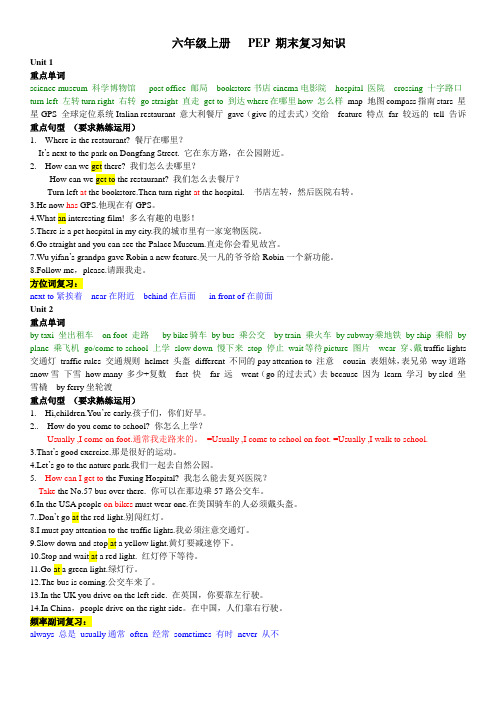
六年级上册PEP 期末复习知识Unit 1重点单词science museum 科学博物馆post office 邮局bookstore书店cinema电影院hospital 医院crossing 十字路口turn left 左转turn right 右转go straight 直走get to 到达where在哪里how 怎么样map 地图compass指南stars 星星GPS 全球定位系统Italian restaurant 意大利餐厅gave(give的过去式)交给feature 特点far 较远的tell 告诉重点句型(要求熟练运用)1.---Where is the restaurant? 餐厅在哪里?---It’s next to the park on Dongfang Street. 它在东方路,在公园附近。
2.---How can we get there? 我们怎么去哪里?--- How can we get to the restaurant? 我们怎么去餐厅?---Turn left at the bookstore.Then turn right at the hospital. 书店左转,然后医院右转。
3.He now has GPS.他现在有GPS。
4.What an interesting film! 多么有趣的电影!5.There is a pet hospital in my city.我的城市里有一家宠物医院。
6.Go straight and you can see the Palace Museum.直走你会看见故宫。
7.Wu yifan’s grandpa gave Robin a new feature.吴一凡的爷爷给Robin一个新功能。
8.Follow me,please.请跟我走。
方位词复习:next to紧挨着near在附近behind在后面in front of在前面Unit 2重点单词by taxi 坐出租车on foot 走路by bike骑车by bus 乘公交by train 乘火车by subway乘地铁by ship 乘船by plane 乘飞机go/come to school 上学slow down 慢下来stop 停止wait等待picture 图片wear 穿、戴traffic lights 交通灯traffic rules 交通规则helmet 头盔different 不同的pay attention to 注意cousin 表姐妹,表兄弟way道路snow雪下雪how many 多少+复数fast 快far 远went(go的过去式)去because 因为learn 学习by sled 坐雪橇by ferry坐轮渡重点句型(要求熟练运用)1.---Hi,children.You’re early.孩子们,你们好早。
pep六年级上册英语期末复习资料

pep六年级上册英语期末复习资料六年级上册英语期末考试即将到来,同学们纷纷开始了紧张复习,为了帮助大家更好地备考,本文给大家提供了一份PEP六年级上册英语期末复习资料。
希望大家认真阅读并向这些资料中汲取知识,以便在考试中取得好成绩。
1. 单词复习在英语考试中,单词是最基础、也是最重要的部分。
下面给大家列出了PEP六年级上册英语单词表,同学们可以结合自己的词汇量逐一复习。
2. 语法复习语法是英语学习中的重点,同学们需要熟练掌握各种基础语法知识,才能在考试中得心应手。
下面给大家列出了PEP六年级上册英语语法知识点:(1)动词时态:一般现在时,一般过去时,将来时,现在进行时,过去进行时,过去将来时。
(2)名词复数形式。
(3)形容词的比较级和最高级。
(4)副词的比较级和最高级。
(5)人称代词的主格和宾格形式。
(6)冠词的用法。
(7)介词的用法。
(8)连词的用法。
3. 阅读理解阅读理解是英语考试中的常考题型,同学们需要熟练掌握阅读技巧,多做练习题,以便在考试中得到高分。
下面给大家列出了PEP六年级上册英语阅读理解练习。
(1)阅读短文,根据内容判断下列句子的正误。
(2)选择正确的单词或短语填空。
(3)根据短文内容回答问题。
(4)写一篇短文,介绍某个场景、人物或事物。
4. 写作写作也是英语考试中的重要部分,同学们需要多练习,熟悉各种写作格式和技巧。
下面给大家列出了PEP六年级上册英语写作题目。
(1)写一篇关于你的假期计划的短文。
(2)介绍你喜欢的动物。
(3)介绍一个你喜欢或崇拜的人。
(4)写一篇短文,谈谈你的家庭成员以及你们的兴趣爱好。
以上就是PEP六年级上册英语期末复习资料,同学们可以结合自己的学习情况,有针对性地进行复习。
相信通过不断地练习和巩固,大家一定能在期末考试中取得好成绩!。
人教版(PEP)六年级英语上册期末复习知识点

人教版(PEP)六年级英语上册期末复习知识点人教版(PEP)六年级英语上册复习知识点Unit 1 How can I get there?主要单词:science科学museum博物馆post office邮局bookstore书店cinema电影院hospital医院crossing十字路口turn转弯left 向左ask问interesting有趣的Italian意大利restaurant餐馆pizza 比萨饼street大街;街道get到达GPS全球卫星定位系统feature特点follow跟着far较远的tell告诉习惯搭配turn left向左转turn right向右转go straight直行in front of...在...前面next to挨着go straight直走near the park在公园附近on Dongfang Street在东方大街上post office邮局pet hospital 宠物医院Beihai Park北海公园Italian restaurant意大利餐馆Palace Museum故宫博物院science museum科学博物馆主要句子:☆1、☆Where is the museum shop?博物馆的市肆在哪儿?☆☆2、It’s near the door.在大门附近。
☆☆3、How can we get there?我们怎么到那儿?☆☆4、Turn left at the bookstore.在书店左转。
☆5、I want to buy a postcard.我想买一张明片。
6、I’ll ask.我去问问。
7、Wow, a talking robot!哇!一个讲话机器人。
8、What a great museum!好棒的一家博物馆!10、There is a pet hospital in my city.在我的城市有一家宠物医院。
11、Wu Yifan and Robin are looking at some robots.吴一凡和罗宾正在看一些机器人。
新版PEP小学英语六年级上册 期末复习知识点归纳

六年级PEP上册知识点总结Unit 1 How can I get there?知识点归纳library 图书馆post office 邮局hospital 医院 turn left 左转 turn right 右转places: cinema 电影院( 地点) bookstore 书店science museum科学博物馆 go straight 直行pet hospital 宠物医院school 学校supermarket 超市 crossing 十字路口shoe store 鞋店Italian restaurant 意大利餐馆问路的重点句型:1.Where is the cinema, please? 请问电影院在哪儿?next to the bookstore 紧挨着书店in front of the school. 在学校的前面.behind the park 在公园的后面It’s near the zoo. 在动物园的附近.on D ongfang S treet 在东方大街上over there 在那边2. Excuse me, is there a cinema near here ?请问这附近有电影院吗?Yes, there is. /No,there isn’t. 有./没有。
3. How can I get to the hospital? 我该怎样到达医院呢?How can I / we get there?我/ 我们怎样到那?回答Turn right/ left at the … 在… 地方向右/ 左转.或Go straight 向前直走.或You can take the No.31 bus. 你可乘坐31路公交车去。
4. Is it far from here? 离这儿远吗?Yes, it is. / No, it isn’t. 是的很远/ 不是很远。
Unit 2 Ways to go to school1.知识点归纳(一)、词汇四会 bike ( 自行车) by ( 乘坐) slow down 慢下来 bus (公共汽车) foot (脚) stop 停下来其他train (火车) how (怎样)交通工具traffic toolsplane ( 飞机) go to school (上学)ship (轮船) taxi 出租车 ferry 轮渡 sled 雪橇subway ( 地铁) (交通工具前加by ,表示乘坐,但步行要用on foot )(二)、重点句型① 询问交通方式用疑问代词how—— How do you go/come to school ? 你怎样去/来上学? —— I go/come to school on foot . 我走路去/来上学。
新版PEP 英语六年级上册期末复习 重点知识整理
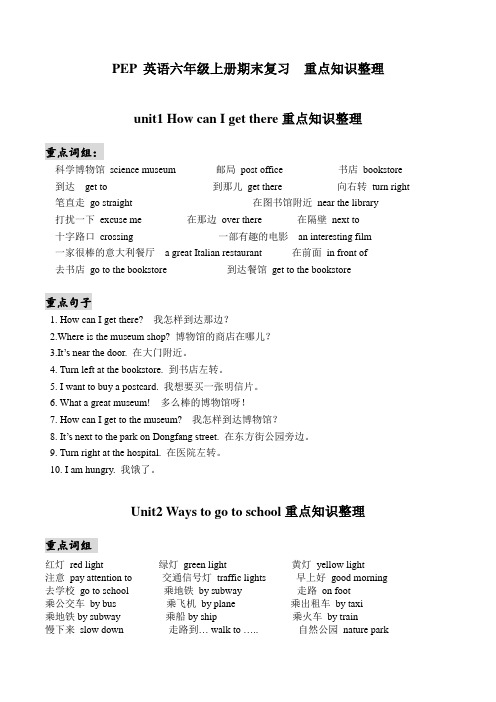
PEP 英语六年级上册期末复习重点知识整理unit1 How can I get there重点知识整理重点词组:科学博物馆science museum 邮局post office 书店bookstore 到达get to 到那儿get there 向右转turn right 笔直走go straight 在图书馆附近near the library打扰一下excuse me 在那边over there 在隔壁next to十字路口crossing 一部有趣的电影an interesting film一家很棒的意大利餐厅 a great Italian restaurant 在前面in front of去书店go to the bookstore 到达餐馆get to the bookstore重点句子1. How can I get there? 我怎样到达那边?2.Where is the museum shop? 博物馆的商店在哪儿?3.It’s near the door. 在大门附近。
4. Turn left at the bookstore. 到书店左转。
5. I want to buy a postcard. 我想要买一张明信片。
6. What a great museum! 多么棒的博物馆呀!7. How can I get to the museum? 我怎样到达博物馆?8. It’s next to the park on Dongfang street. 在东方街公园旁边。
9. Turn right at the hospital. 在医院左转。
10. I am hungry. 我饿了。
Unit2 Ways to go to school重点知识整理重点词组红灯red light 绿灯green light 黄灯yellow light注意pay attention to 交通信号灯traffic lights 早上好good morning去学校go to school 乘地铁by subway 走路on foot乘公交车by bus 乘飞机by plane 乘出租车by taxi乘地铁by subway 乘船by ship 乘火车by train慢下来slow down 走路到… walk to ….. 自然公园nature park乘坐57路公交车take the No.57 bus 在那边overthere自行车的图片pictures of bikes 我的表哥my cousin在美国in the USA 向右看look right 过马路cross the road 在路上on the road 在地铁上in the subway 乘雪橇by sled 乘轮渡by ferry 每天every day重点句型1. You must pay attention to the traffic lights 你必须注意交通信号灯。
新版PEP小学英语六年级上册期末复习知识点归纳
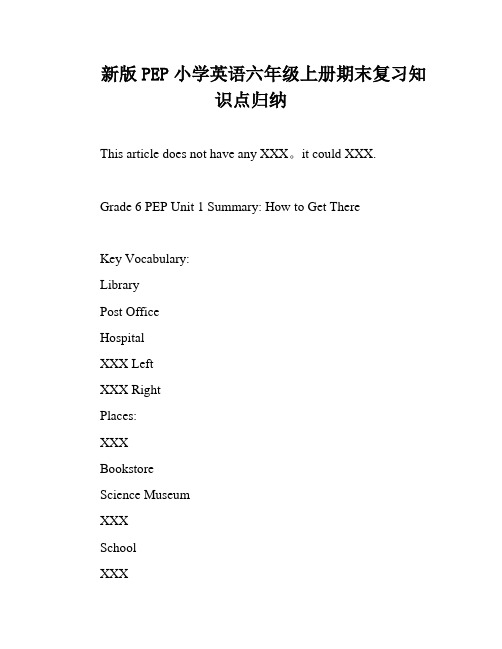
新版PEP小学英语六年级上册期末复习知识点归纳This article does not have any XXX。
it could XXX.Grade 6 PEP Unit 1 Summary: How to Get ThereKey Vocabulary:LibraryPost OfficeHospitalXXX LeftXXX RightPlaces:XXXBookstoreScience MuseumXXXSchoolXXXCrossingShoe StoreXXXKey Phrases for Asking ns:1."Where is the cinema。
please?" - Next to the bookstore。
in front of the school。
behind the park。
near the zoo。
on Dongfang Street。
over there.2."Excuse me。
is there a cinema near here?" - Yes。
there is。
/ No。
there isn't.3."How can I get to the hospital?" - Turn right/left at the。
go straight。
or take the No.31 bus.4."Is it far from here?" - Yes。
it is。
/ No。
it isn't.Grade 6 PEP Unit 2 Summary: Ways to Go to SchoolKey Vocabulary:XXXBySlow DownBusFootXXX.Traffic ToolsWhen it XXX。
there are us ns available。
The train is a popular choice for long-distance travel。
新PEP小学英语六年级上册复习资料(完美版)
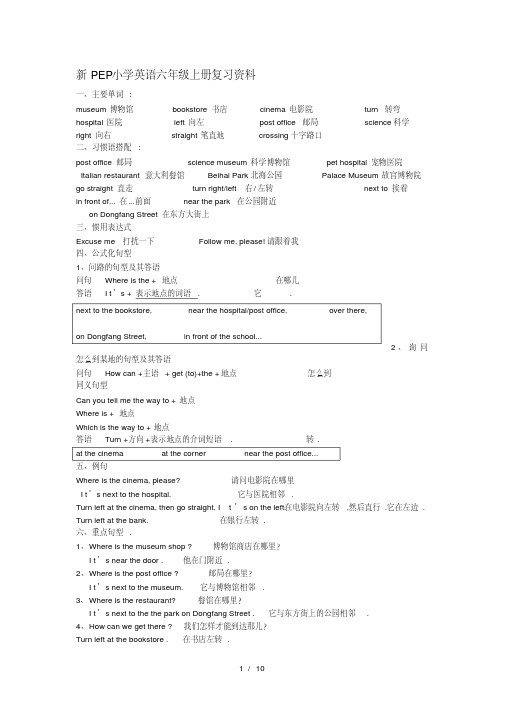
新PEP小学英语六年级上册复习资料一、主要单词:museum博物馆bookstore书店cinema电影院turn 转弯hospital医院left向左post office 邮局science科学right向右straight笔直地crossing十字路口二、习惯语搭配:post office邮局science museum科学博物馆pet hospital宠物医院Italian restaurant意大利餐馆Beihai Park北海公园Palace Museum故宫博物院go straight直走turn right/left右/左转next to挨着in front of...在...前面near the park 在公园附近on Dongfang Street在东方大街上三、惯用表达式Excuse me 打扰一下Follow me, please!请跟着我四、公式化句型1、问路的句型及其答语问句Where is the + 地点···在哪儿答语I t’s + 表示地点的词语. 它···.next to the bookstore, near the hospital/post office, over there,on Dongfang Street, in front of the school...2、询问怎么到某地的句型及其答语问句How can +主语+ get (to)+the +地点···怎么到···同义句型Can you tell me the way to +地点Where is + 地点Which is the way to +地点答语Turn +方向+表示地点的介词短语. ···转.at the cinema at the corner near the post office...五、例句Where is the cinema, please? 请问电影院在哪里I t’s next to the hospital. 它与医院相邻.Turn left at the cinema, then go straight. I t’s on the left. 在电影院向左转,然后直行.它在左边. Turn left at the bank. 在银行左转.六、重点句型.1、Where is the museum shop ? 博物馆商店在哪里?I t’s near the door . 他在门附近.2、Where is the post office ? 邮局在哪里?I t’s next to the museum. 它与博物馆相邻.3、Where is the restaurant? 餐馆在哪里?I t’s next to the the park on Dongfang Street . 它与东方街上的公园相邻.4、How can we get there ? 我们怎样才能到达那儿?Turn left at the bookstore . 在书店左转.Then turn right at the hospital .然后在医院右转.七、要知道的句子.1、I want to buy a postcard. 我想去买一张明信片.2、I want to send it today .今天我想把它寄出去.3、A talking robot .一个会讲话的机器人.4、What a great museum ! 好伟大的一个博物馆啊!5、What an interesting film ! 多么有趣的一部电影啊!Unit 2 Ways to go to school一、主要单词by乘bus公共汽车on foot步行plane飞机taxi出租车ship大船subway地铁train火车slow慢的stop停下always 总是一直usually 通常often经常sometimes 有时候never 从来不, 永不二、习惯语搭配by bike/bus/plane/subway/train/ship/taxi/ferry/sled /boat骑自行车/乘公共汽车/飞机/地铁/火车/船/出租汽车/渡轮take the No.57 bus乘57路公共汽车on foot步行slow down慢下来pay attention to注意traffic lights 交通信号灯look right向右看cross the road横穿马路get off下车at home在家traffic rules交通规则get to到达get on 上车be far from?表示离某地远三、惯用表达式Wait等一等Hooray太好了I see. 我明白了.Go at a green light 绿灯行Stop at a red light 红灯停Wait at a yellow light 黄灯等四、公式化句型1、如何询问对方的出行方式你们怎么来···的2、如何用must表示必须做某事某人+must+动词原形+其它. ···必须···.3、告诫别人不要做某事的句型Don’t +动词原形+其它. .不要/别···.五、例句How do you go to school? 你怎么去上学?Usually I go to school on foot. Sometimes I go by bus.通常我步行去上学.有时候骑自行车去.How can I get to Zhongshan Park ? 我怎么到达中山公园?You can go by the No. 15 bus. 同义句:You can take the No.15 bus.你可以坐15路公共汽车去.I am far from school now. 我现在离学校很远.My home is not far from our school. My home is near our school.我家离学校不远.六、重点句型:1、to school ? 你怎样来上学?2、Usually ,I3、Sometimes I4、I5、But I usually walk . 但是我通常步行.6、How can I get to the Fuxing Hospital ? 我怎样才能到达复兴医院?7、Take the No.57 bus over there . 在那边坐57路公交车.8、In the USA people on bikes must wear one (the helmet).在美国骑自行车的人们必须戴头盔9、Don’t go at the red light . 不要在红灯时走.(不要闯红灯.)10、I must pay attention to the traffic lights.我必须注意交通灯.11、How do you get to the USA from China ?怎样从中国到达美国?七、要知道的句子.1、You’re early . 你早啊.2、That’s good exercise . 那是好的锻炼方式.3、Hooray ! 万岁!4、I see .(I know.)我知道了6、You must look right before you cross the road .你过马路之前必须看右边.7、Let me read this for me . 让我为你读这吧.8、Let’s take a bus . 让我们乘公交吧.主题作文:My familyThere are three people in my family. They are my father, my mother, and I . I usually go to school on foot. My father usually goes to work by car. MY mother often goes to work by bike.On the weekend , I often go to the park by bike. My father often goes to the llibrary by bus. My mother often goes shopping . I often stop and wait at a red light. We must pay attention to the traffic lights.Unit 3 My weekend plan一、主要单词tomorrow明天film电影supermarket超市trip旅行tonight在今晚word单词post card明信片visit拜访二、习惯搭配take a trip去旅行go for a picnic去野餐go to the cinema去看电影learn to swim学习游泳visit my grandparents看望我外祖父母get together 聚会go to the supermarket去超市go ice-skating去滑冰make a snowman堆雪人see a film看电影make mooncakes做月饼read a poem朗诵一首诗get together= be together聚会have a big dinner吃大餐tell us a story 给我们讲故事this weekend这周末Renmin Park人民公园next week下周this morning/afternoon/evening今天上午/下午/晚上next Wednesday下星期三、惯用表达式What about you?你呢Here they are!它们在这儿Can I help you?我能帮助你吗Sounds great!听起来很棒Have a good time!玩得开心You too.你也是四、公式化句型1、询问对方打算做什么的句型及其答语问句What are you going to do +其它你/你们···打算做什么next week tonight tomorrow this morning/afternoon/evening this weekend...答语I’m/We’re going to +动词短语原形+其它. 我/我们打算···.see a film take a trip visit my grandparents watch TV...2、询问对方打算去哪儿的句型及答语问句Where are you going(+将来时间)? 你/你们打算···去哪儿答语I’m/We’re going (to the)+地点. 我/我们打算去···.3、询问对方打算何时去做某事的句型及答语问句When are you going to +动词短语原形你/你们打算什么时候···答语I’m/We’re going to +动词短语原形+将来时间. 我/我们打算···.五、例句What are you going to do on the weekend? 你周末打算做什么I’m going to visit my grandparents this weekend? 这个周末我打算去看望我的外祖父母. Where are you going this afternoon? 你今天下午打算去哪里I’m going to the bookstore. 我打算去书店.What are you going to buy? 你打算去买什么I’六、重点句型.1、What are you going to do tomorrow ? 明天你打算去干什么?I’m going to have an art lesson .我打算去上一节美术课.2、What are you going to do in your lesson ?在你们的课上你们打算去干什么?We’re are going to draw some pictures in Renmin Park !我们打算去人民公园画画.3、What are you going to do today ?今天你打算去干什么?I’m going to see a film . 我打算去看电影.4、Where are you going ?你们打算去哪里?We’re are going to the cinema .我们打算去看电影.We’re are going to see a film about space travel !我们打算去看一部关于太空旅行的电影.5、When are you going?你们打算什么时候去?Next Wednesday .下周三.七、要知道的句子.1、Sounds great! 听起来很棒!2、Have a good time ! 祝你玩的愉快!3、I have to do my homework now .我现在不得不做作业.4、I t’s half price then .那时它是半价.5、I ‘m going to buy some word books .我打算去买一些书.6、”F” is for family . F 代表家庭.主题作文:My family weekend planUnit 4 I have a pen pal一、主要单词studies学习(第三人称单数形式)puzzle谜hiking远足二、习惯搭配read(reads) stories读故事do(does) kungfu练功夫fly kites放风筝play(plays) the pipa弹琵琶play (plays) sports进行体育活动climb mountains爬山listen to music听音乐sing English songs唱英文歌on the playground在运动场上live( lives) in...住在···write an email to...给···写一封电子邮件on a farm在一个农场里三、惯用表达式Me too.我也是. Really?真的吗四、公式化句型1、询问某人爱好的句型及其答语问句What are sb.’s hobbies? ···有什么爱好答语主语+like/likes+动词-ing形式+其它. ···喜欢···.Singing dancing reading stories playing football doing kungfu doingword puzzles going hiking watching TV drawing cartoons listening to musicgoing fishing2、由do/does引导的一般疑问句及其答语问句Do/Does+主语+动词原形+其它答语Yes,主语+do/does. /No,主语+don’t/doesn’t.五、语法1、动词变为动名词的规则动词变为动名词即是动词加ing.一般要遵循以下三条规则(1)一般情况下在动词的后面直接加ing.如play—playing read—reading do—doing go—going(2)以不发音的字母e结尾的动词要去掉不发音的字母e再加ing.如write—writing ride—riding make—making dance—dancing(3)以单元音加单辅音结尾的重读闭音节要双写最后一个辅音字母再加ing.如run—running swim—swimming put—putting sit—sitting2、关于第三人称单数动词变为第三人称单数形式的规则(1)在一个句子中如果主语人称既不是你也不是我而是另外的一个人这时的人称叫做第三人称单数. (2)在第三人称单词的句子中动词要使用第三人称单词形式.(3)动词变为第三人称单数形式要遵循以下规则①一般情况下在动词的后面直接加s.如read--reads make—makes write—writes②以字母s, x, o , sh , ch结尾的动词在词尾加es.如do—does wash—washes teach—teaches go—goes pass—passes ③以y结尾的动词分为两个情况以元音字母加y结尾的动词在词尾直接加s.如play—plays buy--buys以辅音字母加y结尾的动词要把y变为i再加es.如study--studies④以f , fe结尾的名词先把f fe变为v,再加-es.⑤特殊变化have--has(4)在一个第三人称单数的句子中只要句子中出现了does或者其否定形式doesn’t.该句子中的其他动词就要使用原形.(5)第三人称单数的肯定句在变为否定句时在动词的前面加doesn’t. 动词恢复原形.如he lives in Beijing.---he doesn’t live in Beijing.(6) 第三人称单数的陈述句在变为一般疑问句时用does开头后面的动词也要变为原形.如he lives in Beijing.---Does he live in Beijing?3、注意几个单词的变化hobby(复数形式)—hobbies have to(同义词)—must六、反义词或对应词get on(上车)---get off(下车) near(近的)—far(远的) fast(快的)—slow(慢的) because(因为)—why(为什么) same(相同的)—different(不同的)here(这里)---there(那里) east(东)---west(西)north(北)---south(南) left(左)---right(右) get on (上车)---get off(下车)近义词see you---goodbye sure---certainly---of course七、重点句子.1、What are Peter’s hobbies?彼得的爱还是什么?He likes reading stories .他喜欢读故事.He likes doing kung fu and swimming .他喜欢打功夫和游泳.He also likes singing .他也喜欢唱歌.2、You like singing , too .你也喜欢唱歌.3、Does he live in Sydney ?他居住在悉尼么?No, he doesn’t .不;他不在.He lives in Canberra .他居住在堪培拉.4、Does he like doing word puzzles and going hiking ?他喜欢猜字谜和去远足么?Yes,he does .是的;他喜欢.八、要知道的句子.1、He lives on a farm ,so sometimes he reads to the cows .他居住在农场;因此他有时候给奶牛们读书.2、Good idea !好主意!3、What are you doing ? 你正在干什么?I’m writing an email to my new pen pal in Australia .我正在给我的澳大利亚的新笔友写电子邮件.Unit 5 What does he do?一、重点单词factory工厂worker工人postman邮递员police officer警察fisherman渔民scientist科学家pilot飞行员coach教练businessman商人企业家次重点单词:taxi driver 出租车司机cleaner 清洁工writer作家singer 歌手dancer 舞蹈者footplayer 足球运动员secretary秘书head teacher 校长reporter记者 a lion tamer 训狮员bee farmer 蜂农magician 魔术师二、习惯搭配by car/bus/bike/plane/boat乘小汽车/公共汽车/自行车/飞机/船go to work去上班study hard 努力学习work hard 努力工作lots of 许多go to the camp去度假营be good at...擅长···三、惯用表达式Cool!酷What about you?你呢That’s nice.那真好. I see.我明白了.四、公式化句型1、询问他人的职业的句型及其答语;问句What does+主语第三人称单数+do? ···是做什么的答语He/She is a /an+职业名称. 他/她是一位···.worker postman businessman fisherman scientist pilot coach police officer salesperson售货员cleaner清洁工teacher dancer舞蹈演员doctor nurse护士pianist钢琴家dentist牙医tailor裁缝2、询问他人的工作地点的句型及其答语问句Where does+主语第三人称单数+work···在哪儿工作答语He/She works+表示地点的介词短语. 他/她···工作.at a university in a gym at sea on a boat at the zoo3、询问他人的上班方式的问句及其答语问句How does +主语第三人称单数+go to work? ···怎么去上班答语He/She goes to work+交通方式. 他/她···去上班.by bike/bus/subway/plane/train/ship/ferry/...on foot五、一些由动词变化而来的职业名词teach—teacher clean—cleaner sing—singer dance—dancerdrive—driver write—writer TV report—TV reporter act—actoract—actress art—artist engine—engineer六、重点句型:1、What does he do? 他是做什么工作的?He’s a businessman . 他是一名商人.2、What does your mother do ? 你的妈妈是做什么工作的?She’s a head teacher .她是一名校长.3、Where does he work? 他在哪里工作?He works at sea .他在海上工作.4、How does he go to work ? 他怎样去上班?He works on a boat . 他在船上工作.He goes to work by bike .他骑自行车去上班.七、要知道的句子.1、Do you want to be a head teacher ,too ?你也想成为一名校长么?No, I want to be a businessman . 不;我想成为一名商人.2、Is your father a postman ? 你的爸爸是一名邮递员么?No , he isn’t . 不;他不是.3、He sees lots of fish every day ! 他每天都看到许多鱼.4、He has a very healthy life . 他有一个健康的生活.5、He works very hard and stays healthy . 他努力工作并保持健康.6、We should study hard and stay healthy ,too .我们也应该努力学习和保持健康.7、She works at/in a university .她在一所大学上班.主题作文:说说你父母的职业;上班地点和方式;和他们的爱好.My father is a doctor, He often goes to work by car.He works in a hospital. He likes reading books . My mother is an English teacher . She works in a school.She often goes to work on foot. She likes playing the piano. I am a student. I like doing kungfu. I often go to school on foot. I love them very much. How about you?Unit 6 How do you feel ?一、主要单词angry生气的afraid害怕worried担心的发愁的happy高兴的see a doctor看病more更多的wear穿deep深的breath呼吸名词count数数动词sad难过的次重点单词:tired 累的excited 兴奋的bored 无聊的well身体好的thirsty 口渴的dirty 脏的hungry 饿的full 饱的二、习惯搭配feel angry/ill/happy/sad/worried感觉生气/不舒服/高兴/难过/担心be afraid of...害怕···be angry with...(某人)与···生气take a deep breath深深吸一口气count to ten 数到十see a doctor看病do more exercise做更多的运动wear warm clothes穿暖和的衣服chase the mice追赶老鼠drink some drinks喝一些饮料have some popcorn吃一些爆米花make popcorn 制作爆米花三、惯用表达式Here you are.给你. Wait for me.等我一下. Yum!太美味了四、公式化句型1、描述某人/某物害怕什么的句型主语+be动词+afraid of +其他. ···害怕···.2、描述某人/某物与什么生气的句型主语+be动词+angry with+其他. ···与···生气.3、询问某人怎么了的句型及其答语问句What’s wrong? What’s the matter(with you)? 怎么了答语某人+所处的状况.4、建议某人应该做某事的句型某人+should +动词短语原形+其他. ···应该···.take a deep breath count to ten see a doctor do more exercise wear warm clothes...五、做“对句子划线部分提问”试题时一般应该遵循三个步骤1. 确定与句子划线部分相应的特殊疑问词并且特殊疑问词代替相应的划线部分.2. 把特殊疑问词代替划线部分后的句子变成一般疑问句.3. 最后再把特殊疑问词提到句首.以上三个基本步骤可以用三个字来概括即定问提.例如This is a book ?①This is what. ②Is this what ? ③What is this ?注意句①②只是一种变化过程不必写入试题中.句③才是试题所要求的形式和结果必须写到试题上.以上三个步骤是对句子划线部分提问最基本的过程.六、重点句型:1、What’s wrong(with +人)? 某人怎么了?Your father is ill . 你的爸爸生病了.He should see a doctor this morning . 他应该今天早上去看病.2、Don’t be sad . 不要难过.3、How does Dad feel now ? 爸爸现在感觉如何?Not well . 不好.4、How do you feel? 你感觉如何?I feel ……我感觉…..5、They’re afraid of him .他们害怕它(老鼠们).6、The cat is angry with them .猫很生它们(老鼠们)的气.7、Maybe our cat is chasing a mouse now ! 也许我们的猫现在正在追赶一只老鼠!8、Because the mice are bad .因为老鼠们都很坏.七、要知道的句子.1、What should I do ? 我应该做什么?You should +动词原形……你应该….2、What should he /she do ? 她/他应该做什么?He /She should ……主题作文:最近;同学们有的生病了;有的很容易生气;有的很发愁;有的不够强壮;还有的人发冷.你会分别给他们提出建议吗?要求语句通顺;意思连贯;不少于六句.Sam is ill. He should see a doctor. Lucy is angry . She should take a deep breath and count to ten. Tom is worried . He should talk with his parents . Tim is thin. He should do more exercise.Lily is cold. She should wear warm clothes.英语疑问词what,how,who,why,where,when的用法.一、what 什么用来问是什么叫什么做什么等1. What’s your name? 你叫什么名字2.What is in your box? 你的盒子里是什么3. What’s your father?=What does your father do? 你爸爸是干什么的(一)What time 什么时间用来问时间What time is it? 几点了(二)What colour 什么颜色用来问颜色What colour is your bag? 你的书包是什么颜色(三)What about 怎么样用来征求意见或询问感受等,大多用于承接上面的同样问题.1.What bout this pair of shoes? 这双鞋子怎么样2.What about you? 你呢3.What about your dad? 你爸爸呢(四) What day 星期几用来问星期几What day is it today/tomorrow? 今天/明天星期几(五)What date 什么日期问具体的日期1What’s the date today? 今天是几号 2. What date is tomorrow? 明天是几号(六)What ?for 为何目的用来问目的在一定情况下可以与why互换What did you buy that for?=Why did you buy that? 你为什么要买那个二、when 什么时候用来问时间When do you get up?你什么时候起床三、where 哪里用来问地点1. Where is my ruler? 我的尺子在哪里2. Where are you going to ? 你打算去哪里四、which 哪一个用来问具体的哪一个1. Which season do you like best? 你最喜欢哪个季节2.Which class are you in? 你在哪一个班3.Which one is my pen哪一支是我的钢笔五、Who 谁用来问人物是谁1.Who is that boy?那个男孩是谁2. Who are you going to with? 你打算和谁一起去3. Who is that pretty lady?那个漂亮的女士是谁六、whose 谁的用来问东西是谁的1. Whose bag is this? 这是谁的包2.Whose bike is yellow? 谁的自行车是黄色的七、why 为什么用来问原因1.Why do you like spring? 你为什么喜欢春天2. Why did you go there? 你为什么去那里八、how 怎么样用来询问身体等状况1. How are you? 你好吗2. How is your mother? 你妈妈好吗一How old 几岁用来问年龄How old are you? 你几岁了二How long 多长用来问长度How long are your legs? 你的腿多长三How big 多大用来问物体的大小How big is your bedroom? 你的卧室多大四How tall 多高用来问高度How tall is your brother? 你弟弟有多高五How heavy 多重用来问重量How heavy are you? 你有多重六How far 多远用来问路程 2 How far is it from here? 从这儿去有多远七How many 多少用来问数量How many apples do you have? 你有多少苹果八How much 多少钱用来问价格how much is this dress? 这个连衣裙多少钱九How about 怎么样用来征求意见或询问感受等大多用于承接上面的同样问题用法与what about相同1. How about you? 你呢2. How about that shirt? 那件衬衣怎么样。
(完整版)人教版(PEP)小学英语六年级上册复习资料
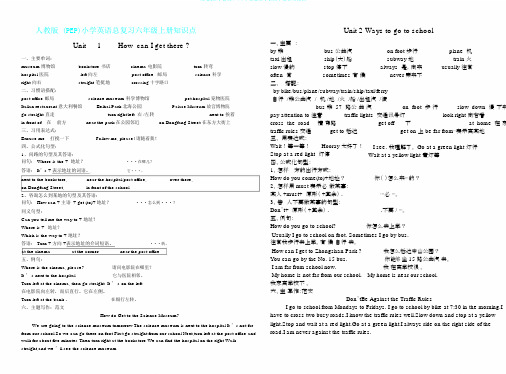
人教版 (PEP)小学英语总复习六年级上册知识点Unit1How can I get there ?一、主要单词:museum 博物馆bookstore 书店cinema 电影院turn 转弯hospital 医院left 向左post office邮局science 科学right 向右straight 笔挺地crossing 十字路口二、习惯语搭配:post office 邮局science museum 科学博物馆pet hospital 宠物医院Italian restaurant 意大利餐馆Beihai Park 北海公园Palace Museum 故宫博物院go straight 直走turn right/left 右 /左转next to 挨着in front of... 在 ...前方near the park 在公园邻近on Dongfang Street 在东方大街上三、习用表达式:Unit 2 Ways to go to school一、主要:by 乘bus 公共汽on foot 步行plane 机taxi 出租ship(大)船subway 地train 火slow 慢的stop 停下always 是,向来usually 往常often 常sometimes 有候never 素来不二、搭配:by bike/bus/plane/subway/train/ship/taxi/ferry自行 /乘公共汽 / 机 /地 /火 /船 /出租汽 /渡bus 乘 57 路公共汽on foot 步行slow down 慢下来pay attention to 注意traffic lights 交通讯号灯look right 向右看cross the road横穿路get off下at home 在家traffic rules 交通get to 抵达get on 上be far from⋯表示离某地Excuse me打搅一下Follow me, please! 请随着我!四、公式化句型:1、问路的句型及其答语:问句: Where is the + 地址?···在哪儿?答语: It’s + 表示地址的词语。
新版PEP六年级英语上册复习资料+练习题
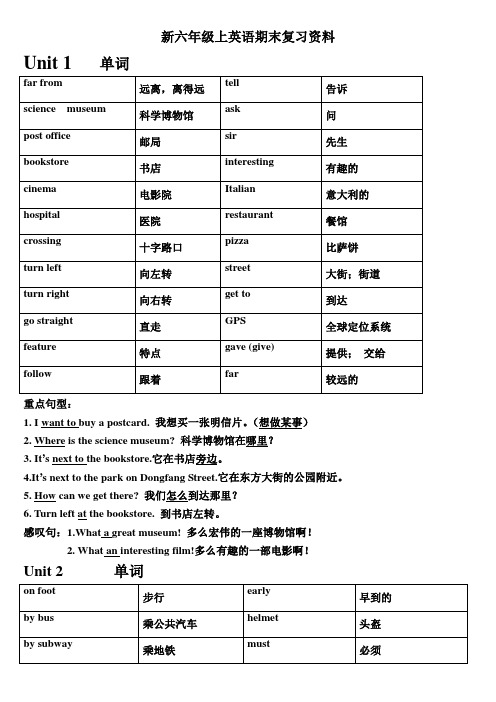
新六年级上英语期末复习资料Unit 1 单词重点句型:1. I want to buy a postcard. 我想买一张明信片。
(想做某事)2. Where is the science museum? 科学博物馆在哪里?3. It’s next to the bookstore.它在书店旁边。
4.It’s next to the park on Dongfang Street.它在东方大街的公园附近。
5. How can we get there? 我们怎么到达那里?6. Turn left at the bookstore. 到书店左转。
感叹句:1.What a great museum! 多么宏伟的一座博物馆啊!2. What an interesting film!多么有趣的一部电影啊!Unit 2 单词重点句型:1.How do you come to school?你怎么来的学校?(go to school去学校)2.I come to school by bike.我骑自行车来的学校。
3.How does he go to school?他怎么去的学校?4.He goes to school on foot.他步行去学校。
5.—How do you get to the USA from China?你怎么从中国到美国?—By plane. 乘飞机。
6.Take the No.57 bus over there.乘那里的57路公交车。
7.I must pay attention to the traffic lights.我必须要注意交通信号灯。
8.The park is over there.公园就在那里。
9. In the USA people on bikes must wear the helmet.在美国人们骑自行车必须戴头盔。
10.Don’t go at the red light! 红灯时禁止通行!11.You must look right before you cross the road. 穿过马路时你必须向右看。
pep小学英语六年级上册复习资料

pep小学英语六年级上册复习资料PEP小学英语六年级上册复习资料随着小学六年级上册英语学习的逐渐结束,孩子们即将迎来期末考试。
为了帮助孩子们更好地复习,本文将提供一些PEP小学英语六年级上册的复习资料,希望能对孩子们的学习有所帮助。
一、基础词汇复习在六年级上册的学习中,孩子们已经掌握了一定的英语词汇量。
在复习过程中,可以通过词汇卡片的方式进行记忆。
将单词写在卡片上,一面写英文,一面写中文,然后将卡片翻过来,通过读英文来回忆中文的意思。
可以通过这种方式来巩固词汇。
二、语法知识复习除了词汇外,语法知识也是英语学习中非常重要的一部分。
在复习过程中,可以通过做一些语法练习来加深对语法知识的理解。
例如,练习使用动词的不同时态,练习使用不同的句型结构等等。
通过这些练习,可以帮助孩子们更好地掌握语法知识。
三、听力训练在六年级上册的学习中,听力训练是非常重要的一环。
通过听力训练,可以提高孩子们的听力理解能力,帮助他们更好地理解英语的听力材料。
可以通过听录音并回答问题的方式来进行听力训练。
还可以通过听故事、听对话等方式来提高听力技巧。
四、口语练习口语练习是英语学习中非常关键的一环。
通过口语练习,可以提高孩子们的口语表达能力,培养他们的英语口语思维。
可以通过角色扮演、对话练习等方式来进行口语练习。
还可以通过与同学或老师进行英语对话来提高口语水平。
五、阅读理解阅读理解是英语学习中非常重要的一项技能。
通过阅读理解练习,可以帮助孩子们提高阅读理解能力,培养他们的阅读习惯。
可以通过阅读短文并回答问题的方式来进行阅读理解练习。
还可以通过阅读故事、文章等来提高阅读理解能力。
六、写作训练写作是英语学习中培养孩子们语言表达能力的重要环节。
通过写作训练,可以提高孩子们的写作能力,培养他们的写作思维。
可以通过写日记、写作文等方式来进行写作训练。
还可以通过与同学或老师进行英语写作交流来提高写作水平。
以上是对PEP小学英语六年级上册的复习资料的介绍。
PEP六年级英语(上册)期末知识点总结

六年级上册英语复习知识点Unit1 HowcanIgetthere?一、主要单词:tasty 美味的LondonEye 伦敦眼stomach 胃gostraight=walkstraight 直走nextto 紧挨着/与⋯相邻farfrom(离⋯远)near 在⋯附近behind(在⋯后面)infrontof (在⋯前面)between⋯and⋯(在⋯和⋯之间)hot(反义词)cold cool( 反义词)warm too (同音词)to/twocannot(缩写)can’t right( 反义词)left/wrong buy( 同音词)by/byesea(同音词)see first (基数词)one four( 序数词)fourthdid( 原形)do/does three( 序数词)third give( 过去式)gave二、重点句型分析1、询问“某人或某物在哪里”的基本句型是:“Where+is/are+ 主语?”,whereis 后接名词或代词的单数形式,whereare 后接名词或代词的复数形式。
表示地点的词:museum博物馆,postoffice 邮局,bookstore 电影院,hospital 医院restaurant 餐馆bank银行busstop湖library图书馆zoo动物园school学校park公园garden馆书店,cinema公交车站lake花园hotel旅2. It’snearthedoor.此句中near是表示位置的介词,意为“旁边,附近”,其同义句是:It’s nexttothedoor. 它在门的旁边。
表示位置的短语:nexttothebookstore挨着书店nearthehospital 在医院附近nearthepostoffice 在邮局附近overthere在那边onDongfangStreet在东方大街上infrontoftheschool在学校前面3.Howcanwegetthere?此句用来询问“怎样去某地”,后面直接跟地点。
最新人教版(PEP)小学英语六年级上册复习资料

最新人教版(PEP)小学英语六年级上册复习资料Unit 1 How Can I Get There?In this unit。
we will learn some XXX.1.Key Vocabulary:museum: a place where you can see art。
historical objects。
or XXXbookstore: a shop where you can buy bookscinema: a place where you can watch moviesturn: to change nhospital: a place where you can receive medical treatmentleft: the opposite of rightpost office: a place where you can send and receive letters and packagesscience: the study of the natural worldright: the opposite of leftstraight: in a direct linecrossing: a place where two or more roads meeteful Phrases:post office: the place where you can send and receive letters and packagesscience museum: a museum where you can learn about scienceXXX animalsXXX: XXX foodXXX: a park in BeijingPalace Museum: a museum in Beijinggo straight: XXXturn right/left: to change n to the right or leftnext to: beside or near somethingin front of: located before or ahead of somethingnear the park: close to the parkXXX: XXXmon ns:Excuse me: a polite way to get someone's nFollow me。
PEP版小学六年级英语上册期末重点总复习

PEP版小学六年级英语上册期末重点总复习PEP六年级上册四会单词Unit 1: by (经……,乘……)。
foot (脚)。
bike (自行车)。
bus (公共汽车)。
train (火车)。
how (怎样)。
go to school。
traffic (交通)。
traffic light (交通灯)。
traffic rule (交通规则)。
(停;停车站)。
wait (等;等待)。
get to (到达)。
by plane (乘飞机)。
___ (乘轮船)。
___ (乘地铁)In this unit。
we learn about different ___ and how to get to school。
We also learn about traffic rules and signs such as traffic lights。
We can get to school by foot。
bike。
bus。
train。
plane。
ship。
or subway。
It's important to follow traffic rules and。
at。
___.Unit 2: library (图书馆)。
post office (邮局)。
___)。
cinema (电影院)。
bookstore (书店)。
turn (转弯)。
then (然后)。
where (在哪里,到哪里)。
please (请)。
next to (与……相邻)。
turnright (向右转)。
turn left (向左转)。
go straight (笔直走)。
north (北)。
south (南)。
east (东)。
west (西)In this unit。
we learn about different places in the community such as the library。
post office。
hospital。
- 1、下载文档前请自行甄别文档内容的完整性,平台不提供额外的编辑、内容补充、找答案等附加服务。
- 2、"仅部分预览"的文档,不可在线预览部分如存在完整性等问题,可反馈申请退款(可完整预览的文档不适用该条件!)。
- 3、如文档侵犯您的权益,请联系客服反馈,我们会尽快为您处理(人工客服工作时间:9:00-18:30)。
六年级PEP上册知识点总结Unit 1 How can I get there? 词汇library 图书馆post office 邮局hospital 医院 turn left 左转places: cinema 电影院( 地点) bookstore 书店 turn right 右转science museum科学博物馆 go straight 直行pet hospital 宠物医院school 学校supermarket 超市 crossing 十字路口hoe store 鞋店Italian restaurant 意大利餐馆问路的重点句型:1.Where is the cinema, please? 请问电影院在哪儿?next to the bookstore 紧挨着书店in front of the school. 在学校的前面.behind the park 在公园的后面It’s near the zoo. 在动物园的附近.on Dongfang Street 在东方大街上over there 在那边2. Excuse me, is there a cinema near here ?请问这附近有电影院吗?Yes, there is. /No,there isn’t. 有./没有。
3. How can I get to the hospital? 我该怎样到达医院呢?How can I / we get there?我/ 我们怎样到那?回答Turn right/ left at the … 在… 地方向右/ 左转.或Go straight 向前直走.或You can take the No.31 bus. 你可乘坐31路公交车去。
4. Is it far from here? 离这儿远吗?Yes, it is. / No, it isn’t.是的很远/ 不是很远。
Unit 2 Ways to go to school知识点归纳(一)、词汇自行车乘坐) slow down 慢下来公共汽车(脚) stop 停下来火车(怎样)飞机(上学)轮船) taxi地铁) ferry 轮渡 sled 雪橇(交通工具前加by ,表示乘坐,但步行要用on foot )(二)、重点句型①询问交通方式用疑问代词how—— How do you go/come to school ? 你怎样去/来上学?—— I go/come to school on foot . 我走路去/来上学。
—— How does your father go to work ? 你父亲怎样去上班?—— He goes to work by subway . 他坐地铁去上班。
②询问地点,用疑问代词whereWhere is your home ? 你家在哪里?It’s near the post office . 在邮局旁边。
Where are the teachers ? 老师们在哪儿They are i n the teacher’s office .在老师的办公室。
问路: How can I get to the Fuxing Hospital? 我怎么去福星医院?You can take the No .1 bus . 你可以乘坐1路公交车。
④交通规则(traffic rules ):Stop and wait at a red light . 红灯停 Go at a green light . 绿灯行Slow down and stop at a yellow light . 黄灯停⑤ You must drive slowly. You must wear a life jacket. You must stop at a red light你必须开慢点。
你必须穿救生衣。
你必须在红灯时停。
Don’t go at a red light. Don’t run on the ferry. Don’t let the dogs run too fast.不要在红灯时走。
不要在轮渡上奔跑。
不要让狗跑的太快。
In the USA people on bikes must wear one. 在美国骑自行车的人必须戴(头盔)。
Don’t go at the red light. 别闯红灯。
I must pay attention to the traffic lights. 我必须注意交通信号灯。
Unit 3 My weekend plan一、知识点归纳(一)、词汇,四会next week /weekend 下周/ 周末 newspaper 报纸this morning 今天上午 comic book 漫画书Time this afternoon 今天下午 word book 单词书(时间 ) this evening 今天晚上 this weekend 这个周末 dictionary 字典tonight 今夜 tomorrow 明天 post card 明信片take a trip 去旅游 theme park 主题公园activities see a film 看电影 others pet shop 宠物店(活动) go to the supermarket 去看电影(其他) supermarket 超市visit my grandparents 参观祖父母 shoe store 鞋店二、重点句式和句型:本单元中出现的一个重点语法是一般将来时:表示将要发生的动作或状态,常和表示将来的时间连用。
构成:陈述肯定句:主语 + be going to + 动词原形+ 其他例子 I am going to (go to) the bookstore by bus this afternoon.He/ She is going to take a trip by train this weekend.We/ They are going to see a film tonight.否定句:主语 + be + not going to +动词原形+其他例子 I am not going to (go to) the bookstore by bus this afternoon.He/ She is not going to take a trip by train this weekend.We/ They are not going to see a film tonight.一般疑问句: Be+ 主语+ going to +动词原形+其他 ?例子: Are you going to the bookstore by bus this afternoon? Yes,I am . No, I’m not.Is he/ She going to take a trip by train this weekend? Yes, he/ She is. No, he/ She isn’t. Are we/ they going to see a film tonight? Yes, we/ they are. No, we/ they aren’t.特殊疑问句:特殊疑问词+ 一般疑问句?例子: What are you going to do this afternoon? Where are you going this afternoon?How are you going to the bookstore this afternoon?When are you going to the bookstore by bus?(以上特殊疑问句中are you 可以替换为is he , is she, are they, are we等)三、重点句型:1.——What are you going to do in the nature park?——I’m going to look for some beautiful leaves.2. ——Where are you going this evening?——We’re going to the cinema.3. ——When are you going ( to the cinema)?——Next Wednesday.(We are going to the cinema next Wednesday.)4. ——How are you going ( to the cinema)?——By bus.( We are going to the cinema by bus)5. we’re going to see a film about space trael! 我们将要去看关于火星之旅的电影。
6 We are going to draw some pictures in Renmin Park.我们打算去人民公园画一些画。
7. Have a good time!玩的愉快。
8. ----What are you going to do in the future? 你将来想干什么?----I’m going to be a science teacher one day.或I want to be a science teacher one day. 我想将来有一天当科学老师。
Unit 4 I have a pen pal本单元的重点是谈论某人的兴趣爱好,语法是动词的-ing形式和动词的第三人称单数形式。
一、词汇: dance (dancing) 跳舞sing (singing ) 唱歌hobby play football (playing football) 踢足球(爱好) read story (reading stories ) 看故事hobbies do kung fu (doing kung fu ) 练武术live (lives) in Shiyan 住在十堰 like (likes) 喜欢teach (teaches) English 教英语 study ( studies Chinese 学习汉语) go (goes) hiking 去远足 cook (cooks ) Chinese food 制作中国食物) 第三人单数 watch (watches) TV 看电视read (reads) newspaper读报纸do (does) word puzzles 猜字谜二、句型:1.询问某人的兴趣爱好:①----What’s your hobby?(单数句式) What are your hobbies?(复数句式)你的爱好是什么?----I like reading stories and singing. 我喜欢读故事书和唱歌。
